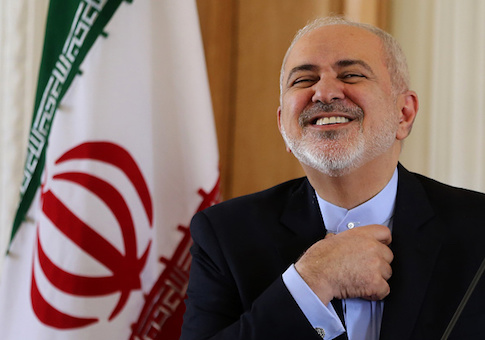MUNICH, Germany—Iran's top diplomat boasted that the Trump administration's international gathering this week to galvanize the globe against Tehran was a colossal failure that only served to further isolate the United States and its Israeli allies.
Those comments were made Friday by Iranian Foreign Minister Javad Zarif, the country's top diplomat and the driving force behind the Obama administration's nuclear deal. Zarif, in a bid to pour fuel on a diplomatic fire lit earlier this week in Warsaw, blasted the White House for failing to drive Arab leaders and European allies further away from Tehran's orbit.
Zarif's comments come against the backdrop of a developing fight in Washington, D.C., including within the Trump administration itself, over further restricting trade with Iran. Multiple sources familiar with upcoming moves by the White House and Congress say the U.S. campaign to crush the Iranian hardline regime is just getting started. However, it remains to be seen just how supportive other elements of the U.S. government will be, particularly in wake of efforts by some officials to keep the nuclear deal alive.
While the Warsaw gathering—which included some 60 foreign diplomats from key Arab and European nations—was initially billed as a forum to rally support for the Trump administration's hardline policies against Iran, international observers were quick to point out that Tehran was not often a centerpiece of the discussions.
A final statement issued by the United States and other nations participating in the ministerial meetings was notable in that Iran was not mentioned by name.
The Iranian government jumped at the opportunity to rap the United States and other allies, claiming the two-day international powwow represents a significant failure in the Trump administration's anti-Iran push.
"The Warsaw conference was already doomed to failure and the loose alliance that was formed in the summit could not reach its goals," Zarif was quoted as telling reporters on Friday in Munich, ahead of the country's annual security conference, where Zarif will be a participant.
Israeli Prime Minister Benjamin Netanyahu, the only head of state to attend the Warsaw summit, garnered international headlines earlier in the week when he stated in Hebrew language remarks that his goal in meeting with Arab leaders was to build a coalition to push "war with Iran." Those comments were later walked back by the prime minister's office, which claimed the Israeli leader was describing a coalition to "combat Iran."
"Netanyahu had officially announced that the participants in the Warsaw conference would prepare for war; however, their loose alliance failed to reach its goal," Zarif said.
"The United States, adopting wrong policies, has made Donald Trump confess that Washington has so far spent seven billion [dollars] in the Middle East, but their efforts have come to naught," Zarif stated.
Iran's Foreign Ministry pointed to the final statement as proof the conference had failed to drive nations further away from the hardline government in Tehran.
"Despite Washington's tremendous efforts to hold an all-inclusive summit and create a new alliance against the Islamic Republic of Iran, the small number and low level of those attending the conference turned the final statement of the summit into a useless document which was developed only by the two organizers of the summit and lacked any credibility," Iran's Foreign Ministry said in comments carried by the country's state-controlled press.
Tehran's rhetoric, while factually justified, fails to acknowledge the deeper intent of the ministerial.
The final statement did not mention Iran, but discussed issues clearly related to the country: Ballistic missiles, illicit financial transactions, cyber espionage, and humanitarian crises. Each of these issues remains a top concern for the United States' many European allies, and chiefly Arab leaders as it related to Iran.
Meanwhile, back in Washington, D.C., top GOP lawmakers are gearing up to launch a new blitz on Iran, according to sources from multiple offices who spoke to the Washington Free Beacon.
The Warsaw ministerial was held amid growing concerns on Capitol Hill about weaknesses in the Trump administration's efforts to further isolate Iran. To that end, lawmakers will seek to ratchet up pressure on Tehran following a brief recess period.
"Lawmakers will strongly support Vice President Pence's timely call for Europe to end the nuke deal, stop helping the terrorist regime in Tehran to evade sanctions, and start standing with the Iranian people in their struggle for freedom and human rights against the theocratic dictatorship," one senior Republican congressional official told the Free Beacon.
The White House National Security Council is said to be in full agreement with these congressional hardliners, a situation that is likely to generate a level of tension with the U.S. State Department, which has faced criticism for what some sources described as its tendency to play both sides of the coin in the Iran debate.
A second senior Congressional official who deals with Iran issues told the Free Beacon that choking off Iran's ongoing oil trade will emerge as a key portion of the new pressure campaign on Tehran.
"Zarif is right that Iran's economy is holding up under pressure, but that has nothing to do with Europe, even though the Europeans have certainly tried. It's because the Trump administration lets Iran export a million barrels a day and stay connected to banks around the world," said the source, who was not authorized to speak on record. "That's both readily apparent and easily solved."
While the Trump administration abandoned the landmark nuclear deal last year, some in the State Department have sought to keep the agreement on life support via talks with European leaders still eager to conduct business with Tehran.
This inter-agency battle is likely to come to a head in the coming weeks as new economic sanctions and Iran's contested missile program make their way back onto Congress's agenda. It has become clear in recent days that the White House and Congress are calibrating a fierce response to Tehran's posturing, sources said.
The State Department declined to comment on Zarif's criticisms.
